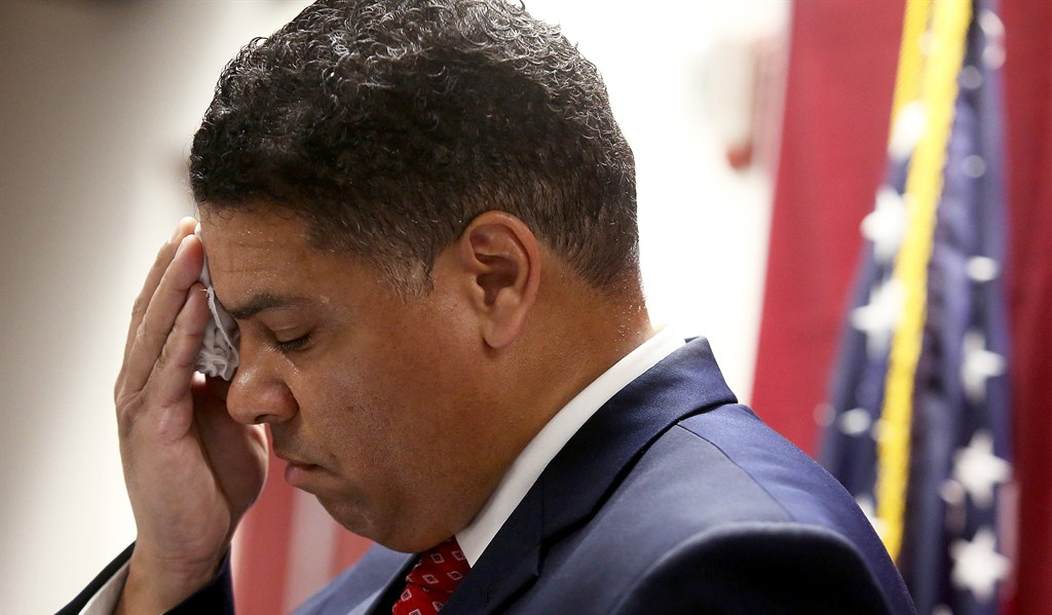Get ready for today’s pop quiz, hot shots! The Associated Press reported on this strange and unsettling case from Wisconsin’s capital, where an armed man appeared to threaten Governor Tony Evers. However, the story doesn’t end there, and that is where our Rorschach test focuses.
Let’s start with the first incident:
The man, who was shirtless and had a holstered handgun, approached the governor’s office on the first floor of the Capitol around 2 p.m. Wednesday, state Department of Administration spokesperson Tatyana Warrick said. The man was demanding to see the governor, who was not in the building at the time, Warrick said. …
The man was taken into custody for openly carrying a firearm in the Capitol, which is against the law, Warrick said. Weapons can be brought into the Capitol if they are concealed and the person has a valid permit. The man arrested did not have a concealed carry permit, Warrick said.
That is quite disturbing, but Wisconsin state police handled it well. Their normal security plan capably dealt with the potential threat, and made sure that the perpetrator and possible assassin got placed in custody.
So far so good, right? Well, that’s when things get … weird. As the movies would say in a subtitle, “Later that day …”:
The man was booked into the Dane County Jail but later posted bail.
He returned to the outside of the Capitol shortly before 9 p.m., three hours after the building closed, with a loaded assault-style rifle and a collapsible police baton in his backpack, Warrick said. He again demanded to see the governor and was taken into custody.
The man said “he did not own a vehicle and it is likely he has access to a large amount of weapons and is comfortable using them,” police said in the bulletin sent to Capitol workers. …
Madison police reported Thursday that the man was taken into protective custody and taken to the hospital. A spokesperson for the police department did not return an email seeking additional details.
Say what?
Let’s recap. Police took the man into custody earlier in the day, and must have had some time to assess his mental state and risk profile. Despite the obvious need under the circumstances for those assessments, bail was so quickly set and easily met that the man got released from custody and could return to the Capitol just seven hours after the first incident. And only then did police deduce that the man needed hospitalization and that he had a cache of weapons at his disposal regardless of how many the police confiscated.
The police don’t set terms for bail. The Dane County DA’s office would have presumably handled that. Ismael Ozanne has served in that position for well over a decade, so he’s not a recent product of the progressive DA projects run by George Soros or other organizations. In fact, three years ago, Ozanne came under some heat for not being progressive enough in terms of racial-disparity outcomes. Still, someone clearly dropped the ball in a case involving a clear threat to the political leadership of the state, and they’re lucky no one got killed when the man returned to the Capitol.
This demands a clear explanation of the decision process that set this individual back on the street. We can expect activists to cite this case as an example of the dangers from a proliferation of firearms, but even if that’s a legit concern, it only takes you as far as the first arrest. The second arrest makes this much more clearly a case of incompetence on the part of prosecutors, and perhaps connected to a reluctance to prosecute at all.
If we threw the book at violators, especially under the weird-enough circumstances of the first incident (shirtless with open carry at the Capitol!), police wouldn’t have to spend time dealing with the same threats again. Laws, even gun control laws, don’t do much when you don’t enforce them, and good policing doesn’t mean much when you simply put dangerous threats back on the street without so much as a second look.








Join the conversation as a VIP Member